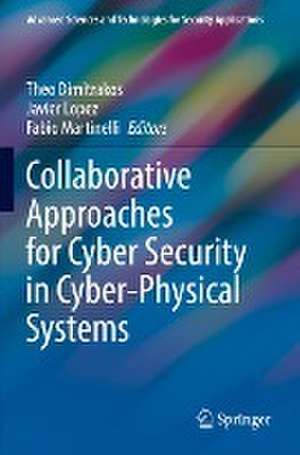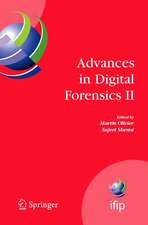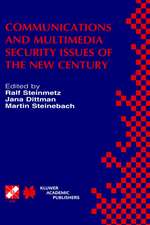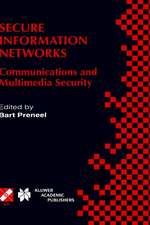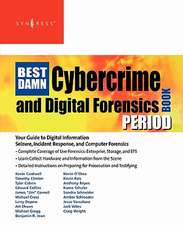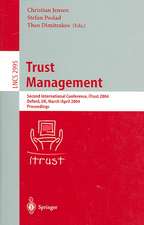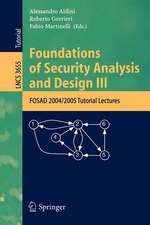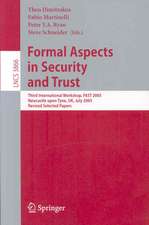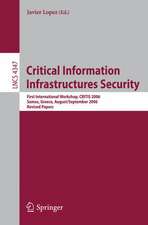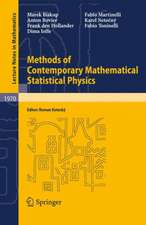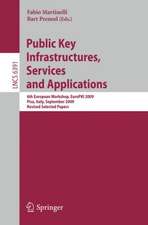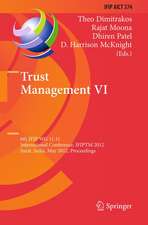Collaborative Approaches for Cyber Security in Cyber-Physical Systems: Advanced Sciences and Technologies for Security Applications
Editat de Theo Dimitrakos, Javier Lopez, Fabio Martinellien Limba Engleză Paperback – 4 ian 2024
Given the pervasively growing dependency of society on IT technology, and the corresponding proliferation of cyber-threats, there is both an imperative need and opportunity to develop a coherent set of techniques to cope with the changing nature of the upcoming cyber-security challenges. These include evolving threats and new technological means to exploit vulnerabilities of cyber-physical systems that have direct socio-technical, societal and economic consequences for Europe and the world. We witness cyber-attacks on large scale infrastructures for energy, transport, healthcare systems and smart systems. The interplay between security and safety issues is now paramount and will be even more relevant in the future.
The book collects contributions from a number of scientists in Europe and presents the results of several European Projects, as NeCS, SPARTA, E-CORRIDOR and C3ISP. It will be of value to industrial researchers, practitioners and engineers developing cyber-physical solutions, as well as academics and students in cyber-security, ICT, and smart technologies in general.
| Toate formatele și edițiile | Preț | Express |
|---|---|---|
| Paperback (1) | 1154.95 lei 6-8 săpt. | |
| Springer International Publishing – 4 ian 2024 | 1154.95 lei 6-8 săpt. | |
| Hardback (1) | 1161.25 lei 6-8 săpt. | |
| Springer International Publishing – 3 ian 2023 | 1161.25 lei 6-8 săpt. |
Din seria Advanced Sciences and Technologies for Security Applications
- 18%
 Preț: 903.93 lei
Preț: 903.93 lei - 18%
 Preț: 738.20 lei
Preț: 738.20 lei - 18%
 Preț: 969.61 lei
Preț: 969.61 lei - 18%
 Preț: 791.88 lei
Preț: 791.88 lei - 20%
 Preț: 994.92 lei
Preț: 994.92 lei - 15%
 Preț: 643.65 lei
Preț: 643.65 lei - 5%
 Preț: 672.98 lei
Preț: 672.98 lei - 15%
 Preț: 649.22 lei
Preț: 649.22 lei - 20%
 Preț: 1051.84 lei
Preț: 1051.84 lei - 15%
 Preț: 704.36 lei
Preț: 704.36 lei - 17%
 Preț: 491.10 lei
Preț: 491.10 lei - 20%
 Preț: 1162.37 lei
Preț: 1162.37 lei - 15%
 Preț: 644.95 lei
Preț: 644.95 lei - 20%
 Preț: 934.69 lei
Preț: 934.69 lei - 20%
 Preț: 1273.74 lei
Preț: 1273.74 lei - 20%
 Preț: 991.60 lei
Preț: 991.60 lei - 20%
 Preț: 936.37 lei
Preț: 936.37 lei - 20%
 Preț: 889.10 lei
Preț: 889.10 lei - 15%
 Preț: 704.36 lei
Preț: 704.36 lei - 9%
 Preț: 732.28 lei
Preț: 732.28 lei - 18%
 Preț: 783.98 lei
Preț: 783.98 lei - 18%
 Preț: 1223.88 lei
Preț: 1223.88 lei - 20%
 Preț: 480.04 lei
Preț: 480.04 lei - 15%
 Preț: 648.42 lei
Preț: 648.42 lei - 18%
 Preț: 1224.36 lei
Preț: 1224.36 lei -
 Preț: 381.43 lei
Preț: 381.43 lei - 20%
 Preț: 1068.42 lei
Preț: 1068.42 lei - 18%
 Preț: 734.59 lei
Preț: 734.59 lei - 15%
 Preț: 586.38 lei
Preț: 586.38 lei - 20%
 Preț: 937.81 lei
Preț: 937.81 lei - 18%
 Preț: 1120.18 lei
Preț: 1120.18 lei - 24%
 Preț: 590.40 lei
Preț: 590.40 lei - 18%
 Preț: 1007.17 lei
Preț: 1007.17 lei - 24%
 Preț: 815.81 lei
Preț: 815.81 lei - 24%
 Preț: 747.51 lei
Preț: 747.51 lei - 20%
 Preț: 937.81 lei
Preț: 937.81 lei - 18%
 Preț: 721.30 lei
Preț: 721.30 lei - 15%
 Preț: 646.75 lei
Preț: 646.75 lei - 15%
 Preț: 698.62 lei
Preț: 698.62 lei - 18%
 Preț: 794.07 lei
Preț: 794.07 lei - 18%
 Preț: 738.06 lei
Preț: 738.06 lei -
 Preț: 388.13 lei
Preț: 388.13 lei
Preț: 1154.95 lei
Preț vechi: 1443.69 lei
-20% Nou
Puncte Express: 1732
Preț estimativ în valută:
220.99€ • 230.74$ • 182.90£
220.99€ • 230.74$ • 182.90£
Carte tipărită la comandă
Livrare economică 05-19 aprilie
Preluare comenzi: 021 569.72.76
Specificații
ISBN-13: 9783031160905
ISBN-10: 3031160908
Pagini: 226
Ilustrații: XII, 226 p. 65 illus., 48 illus. in color.
Dimensiuni: 155 x 235 mm
Greutate: 0.34 kg
Ediția:1st ed. 2023
Editura: Springer International Publishing
Colecția Springer
Seria Advanced Sciences and Technologies for Security Applications
Locul publicării:Cham, Switzerland
ISBN-10: 3031160908
Pagini: 226
Ilustrații: XII, 226 p. 65 illus., 48 illus. in color.
Dimensiuni: 155 x 235 mm
Greutate: 0.34 kg
Ediția:1st ed. 2023
Editura: Springer International Publishing
Colecția Springer
Seria Advanced Sciences and Technologies for Security Applications
Locul publicării:Cham, Switzerland
Cuprins
1. Collaborative and confidential architectures for information sharing and analytics.- 2. Secure Interconnection of large-scale CPS-based frameworks and middleware.- 3. Virtualized security-awareness systems and digital twins.- 4. Empirical evaluation of system vulnerabilities.- 5. Collaborative physical and cyber defense requirements.- 6. Heterogeneous data centric security policies specification and enforcement.- 7. Big data for anomaly and advanced threats detection.- 8. Collaborative identification and ranking of malware.- 9. Visual analytics techniques for cyber security.- 10. Collaborative mitigation methodologies against advanced and persistent attacks.
Notă biografică
Dr. Fabio Martinelli (M) (M.Sc. 1994, Ph.D. 1999) is a senior researcher at IIT-CNR, where he leads the cyber-security programme. He is a co-author of more than two hundred scientific papers. His main research interests involve security and privacy in distributed and mobile systems and foundations of security and trust. He usually teaches at graduate level courses in computer security. He is involved in several Steering Committees of international conferences, workshops, and working groups, like the ERCIM STM WG, IFIP WG 11.14. Fabio Martinelli has been the coordinator of the EU FP7-NoE NESSoS on Engineering Secure Future Internet Services, and he is currently the scientific coordinator of the NeCS and C3ISP EU projects. Fabio Martinelli is the chair of the NIS WG3 and ECSO WG6 devoted to the preparation of the European Cyber-Security Strategic Research and Innovation Agenda.
Prof. Theo Dimitrakos (M) is a part-time Professor of Computer Science at the Schoolof Computing and a Chief Researcher at Huawei. Previously He was at BT’s Research and Innovation division. He has twenty years of research and innovation experience in a range of topics relating to information security, identity and access management, cloud computing, trust management, and cloud computing. Theo also plays a leading role in some of the largest and most successful collaborative European research initiatives. Theo has also served in the programme committee of various academic and industry conferences and the editorial board of international journals. Theo has been an author of 8 books, over 60 technical papers in international conferences and journals and an inventor of over 20 patents. He has been an invited speaker in various security and cloud industry events, a member of the ENISA expert group on cloud security and resilience and a contributor to several advisory reports published by ENISA, CSA, and ISF. He has a PhD in Computing from Imperial College London in the UK and a BSc in Mathematics from the University of Crete in Greece.
Prof. Javier Lopez is Full Professor and Head of the Computer Science Department at the University of Malaga. His research activities are mainly focused on network security, security protocols and critical information infrastructures, leading a number of national and international research projects in those areas, including projects in FP5, FP6 and FP7 European Programmes. Prof. Lopez is the Spanish representative in the IFIP Technical Committee 11 on Security and Protection in Information Systems, as well as the Spanish coordinator of ISO/IEC JTC1/SC27 WG5 on Identity management and privacy technologies. He is Co-Editor in Chief of International Journal of Information Security (IJIS), and a member of the Editorial Boards of, amongst others, IEEE Wireless Communications, Computers and Security, IEEE Internet of Things Journal, Journal of Computer Security, IET Information Security, and International Journal on Critical Infrastructure Protection. In the past, he was Chair of the IFIP Working Group 11.11 on Trust Management and Chair of the ERCIM Working Group on Security and Trust Management.
Prof. Theo Dimitrakos (M) is a part-time Professor of Computer Science at the Schoolof Computing and a Chief Researcher at Huawei. Previously He was at BT’s Research and Innovation division. He has twenty years of research and innovation experience in a range of topics relating to information security, identity and access management, cloud computing, trust management, and cloud computing. Theo also plays a leading role in some of the largest and most successful collaborative European research initiatives. Theo has also served in the programme committee of various academic and industry conferences and the editorial board of international journals. Theo has been an author of 8 books, over 60 technical papers in international conferences and journals and an inventor of over 20 patents. He has been an invited speaker in various security and cloud industry events, a member of the ENISA expert group on cloud security and resilience and a contributor to several advisory reports published by ENISA, CSA, and ISF. He has a PhD in Computing from Imperial College London in the UK and a BSc in Mathematics from the University of Crete in Greece.
Prof. Javier Lopez is Full Professor and Head of the Computer Science Department at the University of Malaga. His research activities are mainly focused on network security, security protocols and critical information infrastructures, leading a number of national and international research projects in those areas, including projects in FP5, FP6 and FP7 European Programmes. Prof. Lopez is the Spanish representative in the IFIP Technical Committee 11 on Security and Protection in Information Systems, as well as the Spanish coordinator of ISO/IEC JTC1/SC27 WG5 on Identity management and privacy technologies. He is Co-Editor in Chief of International Journal of Information Security (IJIS), and a member of the Editorial Boards of, amongst others, IEEE Wireless Communications, Computers and Security, IEEE Internet of Things Journal, Journal of Computer Security, IET Information Security, and International Journal on Critical Infrastructure Protection. In the past, he was Chair of the IFIP Working Group 11.11 on Trust Management and Chair of the ERCIM Working Group on Security and Trust Management.
Textul de pe ultima copertă
This book describes cyber-security issues underpinning several cyber-physical systems and several application domains, proposing a common perspective able to collect similarities as well as depict divergences and specific solution methods. Special attention is given to those approaches and technologies that unleash the power of collaboration among stakeholders, in a field based often developed in isolation and segregation of information.
Given the pervasively growing dependency of society on IT technology, and the corresponding proliferation of cyber-threats, there is both an imperative need and opportunity to develop a coherent set of techniques to cope with the changing nature of the upcoming cyber-security challenges. These include evolving threats and new technological means to exploit vulnerabilities of cyber-physical systems that have direct socio-technical, societal and economic consequences for Europe and the world. We witness cyber-attacks on large scale infrastructures for energy, transport, healthcare systems and smart systems. The interplay between security and safety issues is now paramount and will be even more relevant in the future.
The book collects contributions from a number of scientists in Europe and presents the results of several European Projects, as NeCS, SPARTA, E-CORRIDOR and C3ISP. It will be of value to industrial researchers, practitioners and engineers developing cyber-physical solutions, as well as academics and students in cyber-security, ICT, and smart technologies in general.
Given the pervasively growing dependency of society on IT technology, and the corresponding proliferation of cyber-threats, there is both an imperative need and opportunity to develop a coherent set of techniques to cope with the changing nature of the upcoming cyber-security challenges. These include evolving threats and new technological means to exploit vulnerabilities of cyber-physical systems that have direct socio-technical, societal and economic consequences for Europe and the world. We witness cyber-attacks on large scale infrastructures for energy, transport, healthcare systems and smart systems. The interplay between security and safety issues is now paramount and will be even more relevant in the future.
The book collects contributions from a number of scientists in Europe and presents the results of several European Projects, as NeCS, SPARTA, E-CORRIDOR and C3ISP. It will be of value to industrial researchers, practitioners and engineers developing cyber-physical solutions, as well as academics and students in cyber-security, ICT, and smart technologies in general.
Caracteristici
Deals with collaborative security, a newly developing and promising field Describes generic techniques as well as their applications in several domains Contributes to identifying relevant research and innovation results
